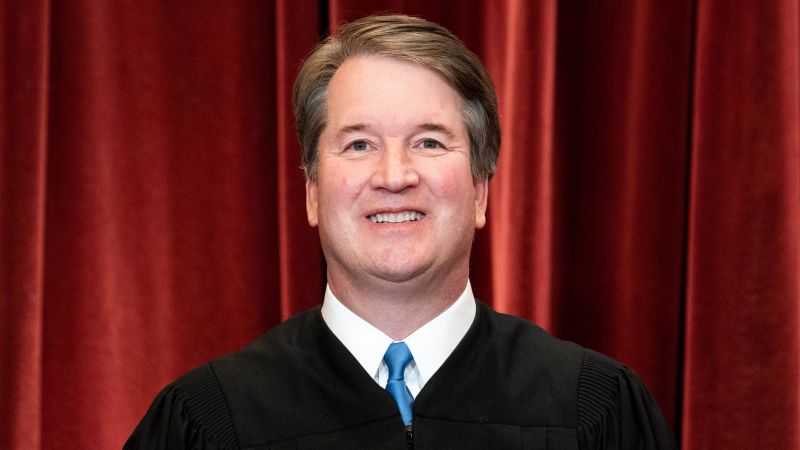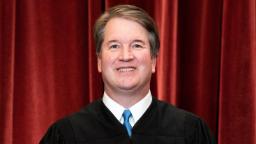

CNN
—
Justice Brett Kavanaugh said this week that he is “optimistic” about the court, his colleagues, and the country in the first-known public comments any justice has made off the bench since the release of an investigative report into the leak of a draft opinion reversing Roe v. Wade.
Kavanaugh, speaking at Notre Dame Law School, did not directly reference the leak investigation, but he said that while judges get a lot of criticism and “heat” at times, he aspires to be an optimist.
“I’m optimistic about the court, I’m optimistic about the country, I’m optimistic about my colleagues,” he said.
Separately, the justice also presented a dissent of US News & World Report’s law school rankings.
His comments were delivered on Monday but only released publicly on Thursday in a video from Notre Dame.
Kavanaugh reminisced about his time working as a lawyer at the White House during the George W. Bush administration and he said he learned from the former president not to worry about “today’s criticism, just stay optimistic about the future.”
Kavanaugh also said that the unusually long lag in the release of the court’s first opinion of the term was simply due to a “coincidence” concerning “which mix of cases” were argued in October and November.
The court only released its first opinion this week – breaking recent tradition.
Court watchers had speculated that the reason the court had waited much longer than usual to issue an opinion this term was that it was anticipating the release of the investigative report. That report was ultimately produced on January 19, with the justices announcing that the Marshal of the court had been unable to identify the person responsible for the leak.
Kavanaugh suggested there was no connection between the report and the lag in opinions.
Kavanaugh also said that the relationships between justices were good despite an array of divisive opinions that were released last term, including the abortion decision, that largely broke down along ideological lines.
“We work well together, we get along together,” he said.
And he praised his two most recent colleagues. He said that he had been charged with throwing a dinner for Justice Amy Coney Barrett to welcome her to the bench and he called her an “unusually good person.” He said that Justice Ketanji Brown Jackson is always “fully prepared” and off to a “great start.”
The leak of the draft opinion last spring triggered protests across the country. In June, a man was arrested in Kavanaugh’s neighborhood and later charged with attempted murder of a Supreme Court justice. Kavanaugh has never made any public remarks about the incident.
Gail Curley, the marshal of the Supreme Court who was tasked last term with investigating the leak, said in her report that her team conducted 126 formal interviews of 97 Supreme Court employees. The employees were asked to sign affidavits, under penalty of perjury, to affirm that they did not disclose the draft opinion and had provided all “pertinent information” related to the disclosure of the draft.
In a separate statement Curley clarified that she had spoken to all nine justices, found nothing to implicate them or their spouses, and declined to require them to sign affidavits.
Kavanaugh also launched into a lengthy criticism of US News & World Report’s ranking of law schools after being asked.
The publication announced earlier this month that it was changing the formula used to determine its list of best law schools after several prestigious institutions – including Kavanaugh’s own Yale Law School – decided to bow out of the famed rankings.
“I think those ratings are very problematic. I think they’re based on things, from what I understand, that are very amorphous, very subjective, very word-of-mouth. Factors that don’t correlate well with the education that you’re actually receiving,” Kavanaugh said.
“And I find them highly problematic. The reputation score – that’s kind of a joke, isn’t it? I mean that’s – who, who has the knowledge of all the different scores that’s judged to give anything approaching a good analysis of that?” the justice added.
“I should probably stop but I’m going to say it anyway,” Kavanaugh added. “They look at some – you know, how much money is spent on this versus that and the library. You know, does that really show whether a student’s getting a better education at school A or school B?”
Asked if he takes the publication’s rankings into account when he’s looking at law clerks, Kavanaugh replied: “No.”
In a letter to law school deans published earlier this month, the publication announced that it would place less importance on surveys that ask academic administrators, lawyers and judges to rate the quality of institutions and more emphasis on measures such as bar exam pass rates and employment outcomes. The changes stem from conversations with more than 100 law school deans and representatives, according to the letter.
